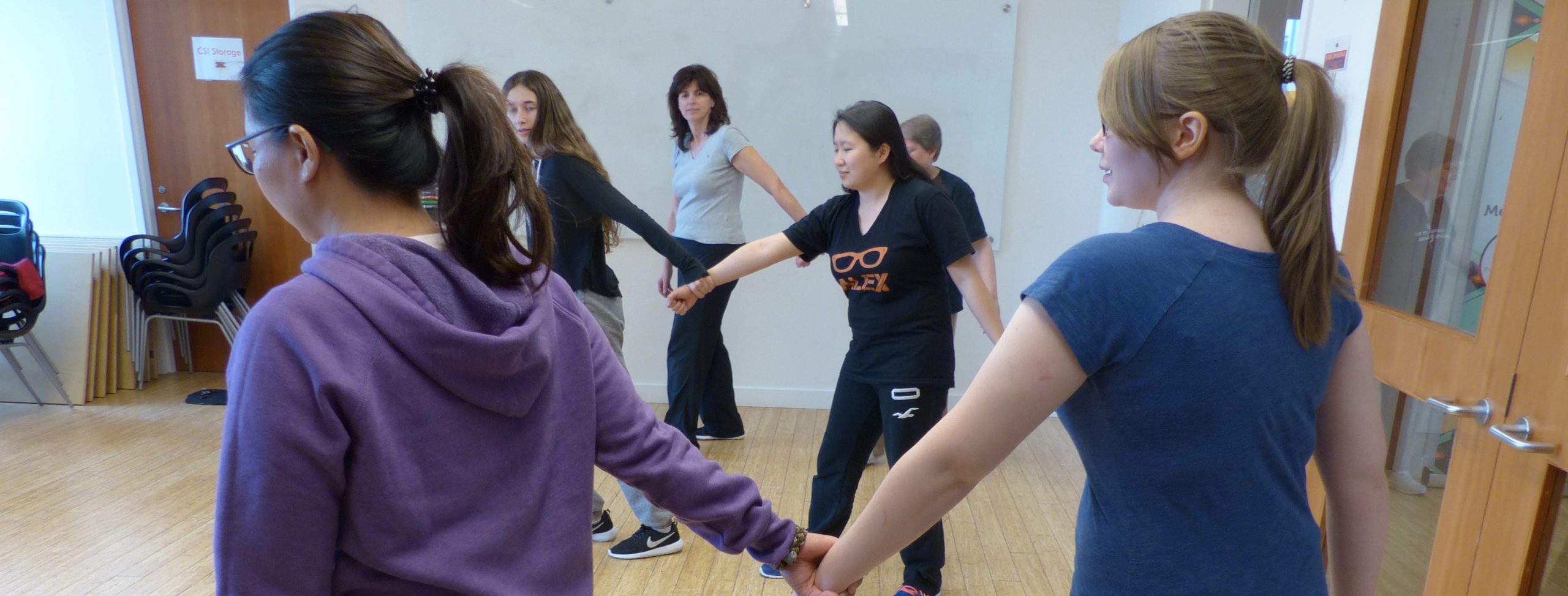Use these links to skip to a question below.
- How could I possibly win a fight against someone bigger and stronger than me?
- Won’t fighting back just make the attacker more angry?
- Do I have to be physically fit to take Wen-Do? What if I have disabilities?
- Can young girls take Wen-Do?
- I’ve been assaulted in the past. I want to take Wen-Do but I’m worried that it could bring up traumatic memories. What do you suggest?
- Why aren’t Wen-Do classes open to everybody?
- There are so many self-defence courses out there. How can I tell if Wen-Do is the right one for me?
How could I possibly win a fight against someone bigger and stronger than me?
You don’t need to “win” the fight in the sense of overpowering the other person. All you need to do is deter the attack long enough for you to escape and get to safety. This is something many women and girls have done, often without any prior self-defence training. Girls as young as 5 and women as old as 101 have successfully used physical self-defence to protect themselves.
In a Wen-Do course you will learn techniques that are designed to be used against a larger, physically stronger attacker. You’ll learn how to break free from holds in ways which don’t require a lot of strength. You’ll also learn about vulnerable spots on the attacker’s body that you can hit if necessary (and even the most muscular body has many weak spots). We’ll also look at a whole range of other strategies in addition to physical self-defence, including awareness, avoidance, and verbal self-defence.
Have a look at the Success Stories section to see examples of the many creative, resourceful, and determined ways that women and girls have protected themselves against people who were bigger than them!
Won’t fighting back just make the attacker more angry?
Many of us have been told, “Don’t fight back if you get attacked, it’ll just make them more angry, and you’ll get hurt worse.” If people say this, it’s because they assume that we can’t fight back effectively. But consider this: If I break an attacker’s kneecap, will he (or she) get angry? Probably. But I’m not sticking around to see how angry this person is, I’m getting out of there as fast as I can. And will the attacker be able to run after me with a broken kneecap? Definitely not!
It is, of course, always possible that fighting back in a given situation could lead to greater injury. But it would be a big mistake to assume that this is the most common outcome. Study after study suggest that women who resist an attempted sexual assault (whether physically or verbally) are able to get away safely much more often than those who do nothing. (See the Research section for more detail about these studies.)
It is important to remember, though, that every situation is unique. In any given situation, each of us must decide for herself whether physical self-defence is the most useful choice, or whether other strategies such as verbal self-defence would be more helpful. Trust your gut feeling.
Do I have to be physically fit to take Wen-Do? What if I have disabilities?
You definitely do NOT need to be fit to take Wen-Do! Women and girls of all shapes, sizes, fitness levels, and ages (10 and up), with and without disabilities, have taken Wen-Do and loved it. If you can’t do a particular technique because of a disability, the instructor will work with you to figure out alternatives. If you use an assistive device such as a cane or a wheelchair, we can also look at ways to use these devices in your own defence. And remember that all students are welcome to take a break when they need to. We hope to host spaces that are welcoming of all women in their diversity, their brilliance, and their courage.
Can young girls take Wen-Do?
The minimum age for taking Wen-Do is 10 years old. If a young girl is attending a class which also includes adult women, we suggest that she take it with her mother, older sister, or another adult. This will give her an opportunity outside of the class to further discuss issues of violence that may come up in the class.
I’ve been assaulted in the past. I want to take Wen-Do but I’m worried that it could bring up traumatic memories. What do you suggest?
Many assault survivors have found taking Wen-Do to be an empowering and healing experience. It is also true, though, that discussing issues of violence and role-playing self-defence scenarios can be emotionally challenging. Only you can decide whether taking Wen-Do is the right choice for you at this time. The following information may be helpful as you consider your decision:
- Participation is optional for all parts of the course. You can observe rather than participating at any time, and you can step out and take a break whenever you need to.
- All participants must ask each other’s permission before putting each other in holds. You will not be taken by surprise.
- It is completely up to you how much, if anything, you wish to tell the instructor or the class about your past experiences.
- We know that women and girls who have been sexually assaulted are often blamed for what happened, in subtle and not-so-subtle ways. Our instructors all work from the belief that NOTHING we do ever causes, provokes, or invites sexual assault. If we were unable to prevent an assault, that does not mean we “should” have done something differently. We always do the best we can with whatever we know at the time. The choices we make to take care of ourselves after an assault, and to help ourselves heal, are, in themselves, a vital part of self-defence.
Why aren’t Wen-Do classes open to everybody?
We know that many people other than women and girls are at high risk of violence. However, a central focus of Wen-Do is the sexism and misogyny to which women and girls are subjected in our society, the ways in which we may internalize such sexism and misogyny, and the impact this may have on our ability to defend ourselves. Wen-Do classes are intended to be safer spaces where women and girls have room to learn psychological and physical self-defence in the context of a largely misogynistic world. Countless women have told us how crucially important it is for them to be able to discuss issues of gender-based violence in a women-only space. Thus, Wen-Do classes are designed for those whose lived gender identity is that of a woman or girl (whether cis or trans). We know that people who do not identify as women also vitally need self-defence training that is sensitive to their needs. Defy: Trans+ self-defense classes, currently taught by certified Wen-Do Women’s Self-Defense instructors, are open to all 2SLGBTQ+ people of ten years and older, and of all abilities. Some people who are both women identifying and members of the queer or trans community may choose to go to either a Wen-Do or Defy: Trans+ class. If you have any questions or concerns about whether Wen-Do or Defy: Trans+ is for you, please contact the instructor of the course that you have chosen.
There are so many self-defence courses out there. How can I tell if Wen-Do is the right one for me?
There are lots of self-defence programs, including Wen-Do, that teach effective physical self-defence techniques. There is so much more to a good self-defence course, though, than punching and kicking and breaking holds. The following information can help you decide whether Wen-Do would be a good fit for you:
- All our courses are taught by women, for women and girls.
- Our physical techniques are meant to be used by women and girls with the bodies they have: large or small, fit or not, disabled or non-disabled.
- We look at many different strategies in addition to physical self-defence, such as awareness, avoidance, and verbal self-defence of various kinds.
- We aim to give our students more choices, not to tell them what to do. We share ideas and suggestions, rather than providing a list of do’s and don’ts. We NEVER suggest that if you don’t follow some precaution or other, then you’re “asking for trouble.” We NEVER blame women and girls for violence committed against them.
- We do all we can to ensure the physical and emotional safety of participants. We practise hits into mats and cushions, not into other students! We also know that role-playing self-defence scenarios can be emotionally challenging. You are welcome to participate at whatever level feels comfortable, and can opt out if you prefer.
- Our approach to teaching is based on the reality of our lives as women and girls. For instance, many self-defence courses focus primarily on preventing attacks by strangers. Although this is certainly important, we know that it is much more common for women and girls to be assaulted by people they know. We keep this in mind whenever we look at self-defence situations, remembering that defending ourselves against someone we know can feel very different from defending ourselves against a stranger.
- We know that both violence and self-defence happen as part of a bigger picture. We talk about many different aspects of violence, such as harassment, relationship abuse, and sexual assault: why they happen, how they happen, and what we can do if they happen to us.
- We know that a woman’s experience of violence may be affected by her age, race, sexual orientation, identity as a transgendered woman, cultural background, physical and mental ability, economic situation, and many other aspects of her experience. We try to make our classes relevant and useful to a broad diversity of women and girls, and to incorporate an anti-oppression analysis into our teaching.
- And last but not least: Even though we’re dealing with serious issues, we also like to make our classes FUN!
But don’t just take our word for it! Have a look at the Success Stories section to see what other women and girls have said about their experience taking Wen-Do.
We hope that the above information has been helpful.
If you have any more questions about any aspect of Wen-Do, please give us a call at 416-929-3636 and ask to speak to an instructor.

